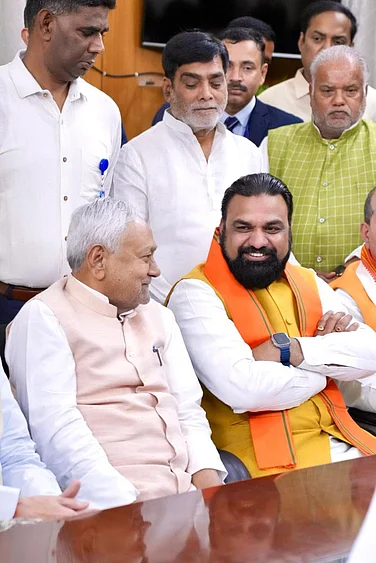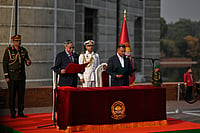Strong disagreements and intense negotiations that went on well past the scheduled end of the 28th edition of the World Climate Summit (COP28) in Dubai finally produced a text that called for “transitioning away” from all fossil fuels – and not just coal – “in a just, orderly and equitable manner” for the world to achieve net zero emissions by 2050.
But the language, which many experts described as “weak” and “compromised”, leaves loopholes that could jeopardise the biggest goal – limiting global warming within 1.5°C from the pre-industrial level by the end of the century, which a series of scientific reports published around the summit says is of utmost necessity. The world is already 1.2°C warmer than pre-industrial level.
At the end of the summit, oil and natural gas producers and users finally conceded some grounds, as the usage of 'fossil fuels’ found a place instead of coal alone being the target. Producers and users of coal managed to remove the condition of “limitations on permitting new and unabated coal power generation” from the draft released on December 11. The provision would have tightened the noose around coal by denying new investments, whereas it is still required in many developing countries, including India, China and South Africa.
The final text retained on coal only what had been earlier agreed to – “accelerating efforts towards the phase-down of unabated coal power.” Oil and gas found no specific mention either but the recognition of “transitional fuels” in playing “a role in facilitating the energy transition while ensuring energy security” is being considered a way to allow the gas industry to operate.
Though coal, crude oil and natural gas are all considered fossil fuels, coal – on which the developing and least developed countries depend – has so long faced a harsher treatment than oil and gas, which are used in and by mostly the rich countries.
The text adopted at COP27 in Egypt called for “accelerating efforts towards the phasedown of unabated coal power” but did not mention oil and gas. Therefore, ‘fossil fuel lobbyists’ in the current usage mostly refer to the oil and gas sector.
“From an Indian perspective, this text displays greater parity between coal and other fossil fuels but it appears to absolve developed countries of the responsibility of phasing out their fossil fuel use ‘in this critical decade’,” said Ulka Kelkar, executive director, climate, at the World Resources Institute’s India chapter.
She added that the reference to “transitional fuels” explicitly gives gas-producing countries the license to sell more gas rather than invest in renewable energy.
Vibhuti Garg, Director, South Asia, at the Institute for Energy Economics and Financial Analysis (IEEFA), echoed. “The real winners of the new draft text are the fossil producers that continue to term ‘gas’ as the transitional fuel,” she said.
RR Rashmi, a Distinguished Fellow at The Energy Research Institute (TERI), pointed out that the new text continued to treat coal anf oil and gas differently. “The decision highlights the need for orderly and just transition in all energy systems, but singles out the need of phasing down unabated coal plants. This tilts it against the developing countries,” he said.
The UN Environment Programme (UNEP)’s Emissions Gap Report (EGR) published in November, reveals how existing climate goals were already biased in favour of the richer countries. It shows that the road to limiting global warming within 1.5°C requires an “unabated coal power decline” by 88 percent from 2020 to 2030, while for gas and oil the reduction requirement was 14% and 10%, respectively.
The EGR, published a few days before COP28, called for “faster declines in oil and gas use, and greater efforts by high-income countries” to allow a just transition in coal-dependent countries like India, Brazil and South Africa, where millions to dependent on the coal economy and a rapid transition would mean an economic disaster.
Reacting to the EGR, Tom Mitchell, executive director of the policy and action research organisation International Institute for Environment and Development (IIED), had said that “the international investment regime protecting the interests of Big Oil is one example” of “deeply embedded aspects of the economic, legal and financial status quo.”
The Dubai summit, though started with a lot of expectations and anxieties over a possible decision to phase out of fossil fuels, never fully came out of the shadow of the oil and gas lobby, often referred to as the fossil fuel lobby – in which mostly the richer countries have a stake.
The host country, the United Arab Emirates (UAE), gets about 40% of its income from oil and gas and stands at the risk of income decrease in case a faster phase-out of all fossil fuels is mandated by the conference. Soon after the summit began, a report published by the Kick Big Polluters Out (KBPO) coalition revealed that the summit saw nearly 2,500 fossil fuel lobbyists granted access.
It signalled “an unprecedented presence at crucial climate talks from representatives of some of the world’s biggest polluters,” said the report. These lobbyists got access as part of trade associations and “nine out of the ten biggest of these groups came from the Global North.”
The number of fossil fuel lobbyists permitted entry to the Dubai talks is More than seven times higher than official indigenous representatives (316) and more than all the delegates from the ten most climate-vulnerable nations combined (1509).
It underscored “how industry presence is dwarfing that of those on the frontlines of the crisis,” said the KBPO report, reflecting the continued bias in institutional climate dialogues in favour of the rich.
If filling the venue with lobbyists was not enough, the Organisation of Petroleum Exporting Countries (OPEC)’s general secretary, oil-rich Kuwait’s Haitham al-Ghais, also wrote to all OPEC member countries, including UAE, urging the oil states to “proactively reject any text or formula that targets energy, i.e. fossil fuels, rather than emissions.”
The results were visible on December 11, the penultimate day of the summit, when the updated text of the Global Stock Taking (GST) – a much-anticipated appraisal – reflected continued favour for oil and gas.
The words “oil and gas” did not appear anywhere in the text but ‘fossil fuel’ found a mention for the first time. Nevertheless, the tone was softer: “Reducing both consumption and production of fossil fuels, in a just, orderly and equitable manner so as to achieve net zero by, before, or around 2050 in keeping with the science.”
But for coal, it called for “rapidly phasing down unabated coal” and added the aspect of “limitations on permitting new and unabated coal power generation.”
Intense opposition to this discrimination, mostly from developing countries, finally led to the modification of the text.
According to Harjeet Singh, head of global political strategy at Climate Action Network International, after decades of evasion, COP28 finally “cast a glaring spotlight on the real culprits of the climate crisis: fossil fuels” in a “long-overdue direction to move away from coal, oil, and gas” but the resolution “is marred by loopholes.”
The loopholes offer the fossil fuel industry numerous escape routes, relying on unproven, unsafe technologies, Singh said.
Linda Kalcher, executive director at the pan-European think-tank Strategic Perspectives, while welcoming the first-ever mention of the need to stop burning fossil fuels at a UN climate text, pointed out it was “still heavy with loopholes.”
It lacks timelines and fails to provide the support that the majority of the world’s people are going to need to finance the rapid transition that is now required, she said.
“Maybe this is the best that a COP being guided by the invisible hand of oil lobbies can deliver,” said Vaibhav Chaturvedi, a fellow at the non-profit Council on Energy, Environment and Water (CEEW).






















